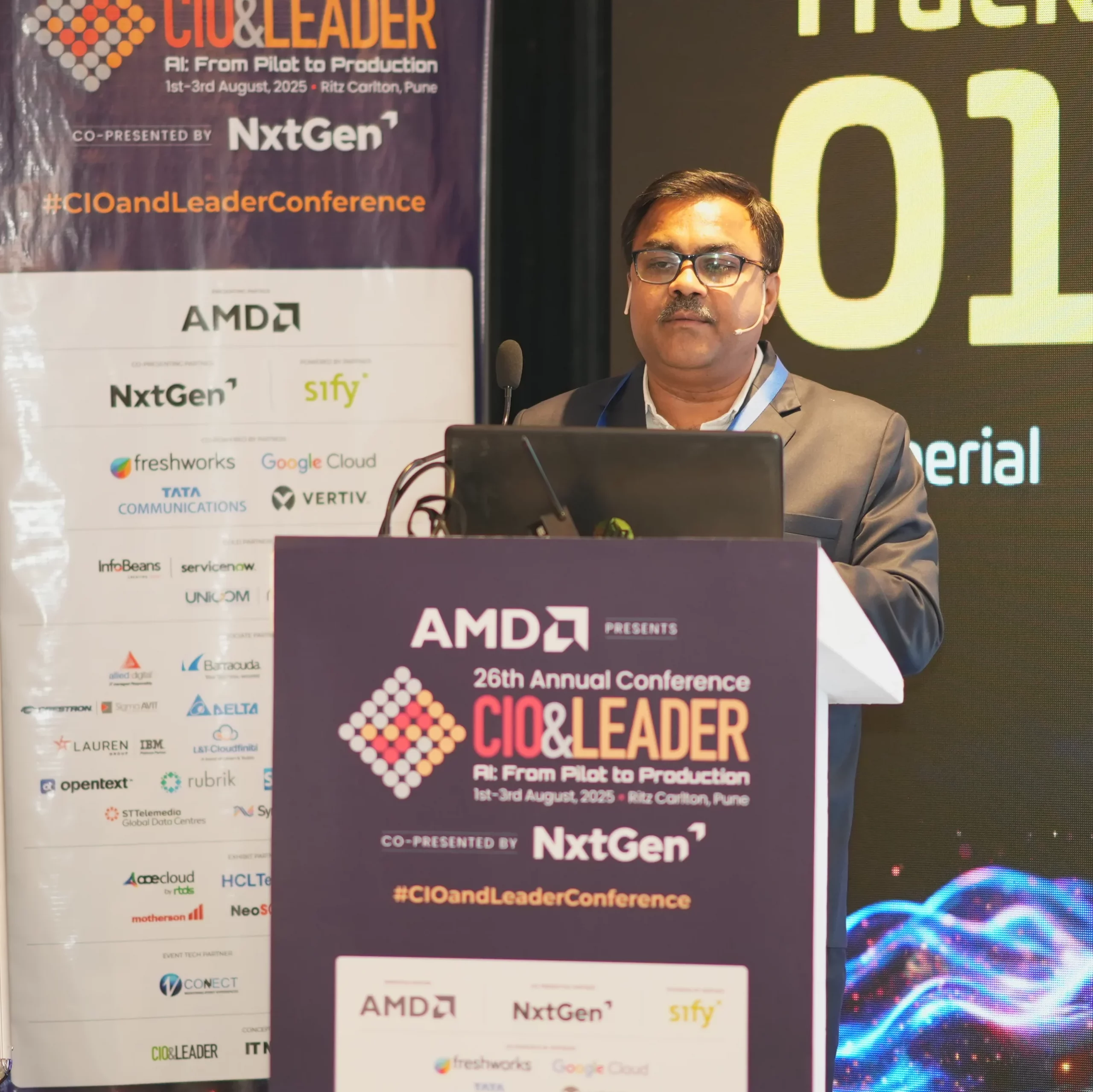Kripyaduti Sarkar, Group CIO of AmbujaNeotia Group, shares blueprint for making artificial Intelligence production-ready.

“AI isn’t just about automation, it’s about transformation,” said Kripyaduti Sarkar, Group CIO of AmbujaNeotia Group, as he unraveled the realities of deploying artificial intelligence in diverse business environments. With operations spanning real estate, hospitality, and healthcare, Sarkar has lived the challenges of aligning vision with execution, budgets with impact, and innovation with business pragmatism. His keynote, Scaling AI in Diverse Environments: Lessons & Best Practices, was less a theoretical pitch and more a hands-on playbook for CIOs trying to make AI truly production-ready.
The CIO-CFO Balancing Act
One of Sarkar’s most striking insights was the tension between CIOs and CFOs. “The CIO dreams big with AI, but the CFO fears unguaranteed ROI,” he explained. His strategy: start small, deliver fast. By executing small-ticket AI projects that yield visible results within a quarter, CIOs can establish credibility, secure funding, and strengthen their case for larger transformation projects.
Data: The Bedrock of AI
Sarkar cautioned against rushing into AI without ensuring a robust data foundation. Many initiatives, he argued, collapse because teams underestimate the challenge of data availability and integration. “Without the right data, your AI project will fail no matter how visionary it sounds.” His advice: consolidate structured and unstructured data across departments, then build projects where datasets are rich enough to train and sustain AI models.
Smart Partnerships, Smarter Investments
Budgets are always tight, Sarkar admitted. His solution? Collaborative proof-of-concepts with partners. By contributing intellectual property (such as unique use cases) while expecting vendors to co-invest in pilots, companies can minimize risk and only scale solutions that prove their worth. “Your vendor should have skin in the game,” he said, framing partnerships not as transactions but as co-innovations.
Playing the Long Game: CIO as Innovator
For Sarkar, short-term wins are essential, but long-term vision is the accurate measure of a CIO. He argued that CIOs must be seen not just as technology custodians but as innovation leaders with a clear roadmap. Transformational AI projects that tackle larger business challenges over 12–18 months require patience, compelling storytelling, and the ability to manage expectations tightly. “Share the bigger vision with the board, not the entire organization,” he advised, stressing the importance of controlling timelines and outcomes.
Lessons from the Frontline: AI at AmbujaNeotia
Sarkar’s blueprint wasn’t a theory; it was grounded in practice. He highlighted several AI deployments across AmbujaNeotia’s businesses:
- Sentiment Analysis: Leveraging customer reviews from social media to gauge brand health in hospitality and healthcare.
- Customer Engagement Analytics: Using CCTV footage in malls to map foot traffic, optimize rental negotiations, and improve space utilization.
- Conversational AI Agents: Building a chatbot trained on decades of company emails, contracts, and RFQs to serve as a digital assistant for senior leaders.
- AI-Driven Design Automation: Deploying Maced.ai to slash real estate design timelines from four months to just one, saving both time and executive bandwidth.
- Construction Monitoring with Open-Space AI: Using helmet-mounted cameras to detect deviations between actual builds and architectural drawings in real time.
Each project delivered a measurable impact, from cost savings and process acceleration to more substantial improvements in customer experience.
The Ethical Imperative
Sarkar didn’t shy away from the pitfalls: data privacy, algorithmic bias, lack of explainability, and regulatory compliance. He urged leaders to avoid “AI for the sake of AI,” insisting on clear KPIs and measurement frameworks before embarking on any initiative. “Understand, verify, and be convinced, then become passionate,” he said, underscoring the importance of intentionality in adoption.
The Takeaway: Pragmatism Over Hype
In closing, Sarkar reframed the AI journey as a pragmatic balance of vision and execution. Quick wins build momentum, strong data underpins credibility, partnerships reduce risk, and ethical clarity safeguards sustainability. Above all, he positioned the CIO not just as a technology leader but as a business strategist shaping the future of organizations through intelligent, production-ready AI.